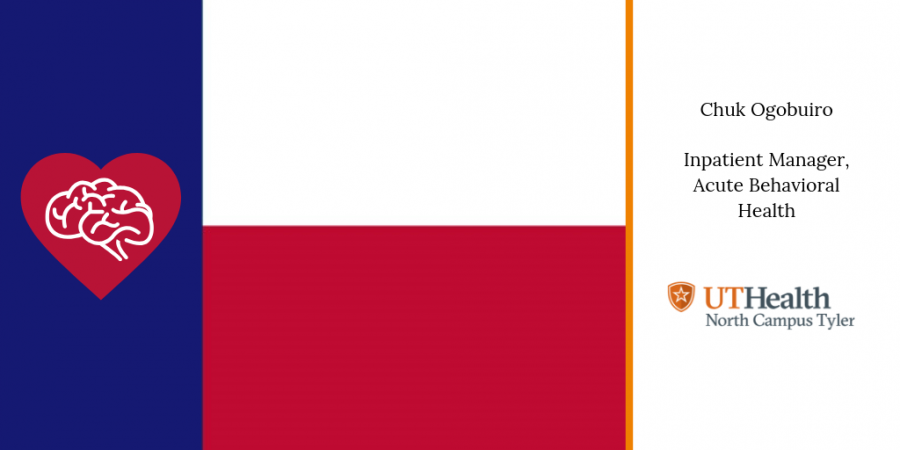May is mental health awareness month. So, what are some facts about the state of mental health in the United States, in Texas and in our East Texas community? What are some self-care strategies you can use to keep yourself mentally healthy?
A mental illness is a condition that affects a person’s thinking, feeling or mood. Such conditions may affect someone’s ability to relate to others and function each day. Each person will have different experiences, even people with the same diagnosis. A mental health condition isn’t the result of one event. Research suggests multiple linking causes. Genetics, environment and lifestyle may influence whether someone develops a mental health condition. A stressful job or home life makes some people more susceptible, as do traumatic life events like being the victim of a crime. Biochemical processes and basic brain structure may play a role, too. In addition to a person directly experiencing a mental illness, family, friends and communities are also affected. The good news is many people who suffer from mental illness recover well.
What are some facts?
-
Mental health populations are vulnerable, with limited access to care and lower care-seeking behavior due to stigmatization and discrimination.
-
Approximately 1 in 5 adults in the U.S. — 43.8 million, or 18.5% — experiences mental illness each year.
-
Approximately 1 in 25 adults in the U.S. — 9.8 million, or 4 % — experiences a serious mental illness in a given year that substantially interferes with or limits one or more major life activities. Serious mental illnesses include schizophrenia, bipolar and major depression.
-
Nearly 50% of U.S. adults will develop at least one mental illness during their lifetime.
-
An estimated 26% of homeless adults staying in shelters live with serious mental illness, and an estimated 46% live with severe mental illness and/or substance use disorders.
-
Suicide is the 10th leading cause of death in the U.S., the 3rd leading cause of death for people aged 10–14 and the 2nd leading cause of death for people aged 15–24.
-
More than 90% of children who die by suicide have a mental health condition.
-
Each day an estimated 18-22 veterans die by suicide.
-
Of the almost 19.8 million adults age 18 years and older in Texas, close to 1 million adults, or 5% of the total Texas adult population has serious mental illness. That’s 1 in 20 adults, more than 1 in 25 for the broader US.
-
Typically, suicide is an outcome of mental health disorders, including mood, personality, and substance use disorders.
-
3,043 Texans died from suicide in 2015.This is more than double the number killed by homicide, was the second leading cause of death for ages 15-24, (after unintentional injuries e.g. car accidents), and was the fourth leading cause of death for ages 15-64 in Texas.
-
Since 2005, suicide rates in Northeast Texas have been consistently higher than those in Texas overall, and higher than those in the U.S.
-
In 2014, the suicide rate in Northeast Texas was 43% higher than in Texas and exceeded the Healthy People 2020 target by 73%.
Self-care strategies
With some of these strategies recommended by the National Alliance for Mental Health, you will better be able to adapt to changes, build strong relationships and recover from setbacks.
- Protect your physical health. Improving your physical well-being is one of the most comprehensive ways you can support your mental health. This can be accomplished through daily exercise, eating healthy, getting enough sleep, avoiding alcohol and drugs and practicing relaxation exercise.
- Recharge yourself. It can be difficult to find time for yourself, and even when you do, you may feel distracted by thinking about what you “should” be doing instead. Learning to make time for yourself without feeling you’re neglecting others is critical. Start small. Think about activities you enjoy and try to work them into your life.
- Practice good mental habits.
- Avoid guilt: When you allow yourself to notice your feelings without judging them as good or bad, you dial down the stress and feel more in control. When you feel less stressed, you’re better able to thoughtfully choose how to act.
- Notice the positive: When you take the time to notice positive moments in your day, your experience of that day becomes better. Even if the positive thing is tiny (“It was a sunny day”), it’s real and it counts. These positive moments can start to change your experience of life.
- Gather strength from others: Talking about your experiences can help. The idea that you can or should be able to “solve” things by yourself is false. Being willing to accept help is a great life skill.
Taking charge of your mental health can start with simple changes to your routine. Finds some tips on beneficial behaviors here. You can also discuss any mental health concerns with a primary care physician. They are there to listen and help you in any they can. To find a primary care physician, please call 903-596-DOCS.

Chuk Ogobuiro, MSN, MBA, RN-BC, NEA-BC
Inpatient Manager, Acute Behavioral Health
Chuk Ogobuiro is the Inpatient Manager of Acute Behavioral Health department at the UT Health North Campus Tyler. In his role, Chuk provides clinical support to nursing, physicians, social work and psychology staff in providng high quality, cost effective, evidence-based care to individuals suffering from serious mental illness. Chuk is a nurse leader passionate about serving people and improving health outcomes through evidence based practice. He is currently pursuing a Doctor of Nursing Practice Degree at The University of Texas at Tyler.
References
-
Center of Disease Control and Prevention (2015). 10 Leading Causes of Death by Age Group, United States-2015. Retrieved from https://www.cdc.gov/injury/images/lc-charts/leading_causes_of_death_age_… (Links to an external site.) Links to an external site.
-
National Institute for Mental Health (n.d.). Mental illness. Retrieved from http://www.nimh.nih.gov/health/statistics/prevalence/any-mental-illness-… (Links to an external site.) Links to an external site.
-
U.S. Department of Housing and Urban Development, Office of Community Planning and Development. (2011). The 2010 annual homeless assessment report to congress. Retrieved from https://www.hudexchange.info/resources/docume (Links to an external site.) Links to an external site.
-
U.S. Department of Health and Human Services. (1999). Mental Health: A Report of the Surgeon General. Rockville, MD: U.S. Department of Health and Human Services, Substance Abuse and Mental Health Services Administration, Center for Mental Health Services, National Institute of Mental Health. Retrieved January 16, 2015, from http://profiles.nlm.nih.gov/ps/access/NNBBJC.pdf (Links to an external site.) Links to an external site.
-
U.S. Department of Veteran Affairs Mental Health Services Suicide Prevention Program. (2012). Suicide Data Report, 2012. Kemp, J. & Bossarte, R. Retrieved from http://www.va.gov/opa/docs/Suicide-Data-Report-2012-final.pdf (Links to an external site.) Links to an external site.
-
Nehme, E., Oppenheimer, D., Elerian, N., Lakey, D. (2017). Suicide in Texas. Austin, TX: University of Texas Health Science Center at Tyler/University of Texas System.
-
The University of Texas System, (2016). The health status of Northeast Texas. Retrieved form https://utsystem.edu/sites/default/files/news/assets/northeasttx-health-…
-
National Alliance for Mental Health (2019): Taking care of yourself. Retrieved from https://www.nami.org/Find-Support/Family-Members-and-Caregivers/Taking-C…

